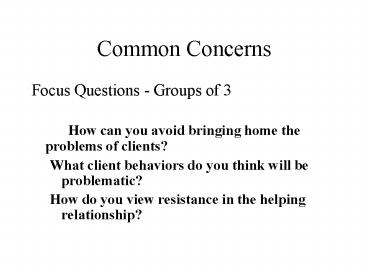Common Concerns - PowerPoint PPT Presentation
1 / 12
Title:
Common Concerns
Description:
What client behaviors do you think will be problematic? How do you view resistance in the ... Try to befriend helper. May develop an attraction toward helper. ... – PowerPoint PPT presentation
Number of Views:90
Avg rating:3.0/5.0
Title: Common Concerns
1
Common Concerns
- Focus Questions - Groups of 3
- How can you avoid bringing home the problems of
clients? - What client behaviors do you think will be
problematic? - How do you view resistance in the helping
relationship?
2
Exploring Your Own Self-Doubts and Fears as a
Helper
- Complete T-F survey on page 101.
- Do You see a pattern of concern?
- Begin to challenge your assumptions!!!
3
Transference Countertransference
- Transference -
- Essential to understand where the client
behavior or reaction is coming from. - Cannot take it personal!! (Stand In)
- Most client feelings / reactions to helper
result from past issues, biases, relationships,
assumptions. - Examples -
- Super person - see you as perfect all-knowing.
- Replacement - of father, mother, spouse. Can be
positive or negative.
4
Transference Contd
- Unrealistic Demands - frequently call between
sessions. Run over allotted time. Expect not to
be challenged. - No Boundaries - similar to above. Try to
befriend helper. May develop an attraction
toward helper. - Displaced Anger - Taking out frustration on
- helper. CAUTION - Sometimes client really is
mad a helper!! - What to do -
- Gain insight to why. Check your own emotions.
- When appropriate, disclose the issue to the
client. - Keep it positive!! Chance for client to have
deeper understanding.
5
Countertransference
- It will happen - trick is knowing how to manage
it. - Are you taking it personal??
- Is it your issue or the clients issue?
- Are you working with the person across from you??
- Some subtle signs -
- Encourage client dependency
- Overprotective
- Avoid certain topics
- Lecture or debate with client
- Want to solve problem for client
- Become extremely irritated with certain clients.
6
Dealing With Difficult Clients
- Attitude Questionnaire
- Pg. 110
- Notice any perceptions about resistance in your
responses??
7
Resistance From A Client
- Points To Ponder -
- Natural part of therapeutic process.
- Not all resistance is bad!! (common coping
mechanism for some / self preservation / survival
during crisis). - Learn to respect client resistance and
understand its meaning. - Look at resistance as a coping strategy that has
outlived its purpose!! - It is important to practice patience and monitor
your reactions toward client. - Avoid using resistant word with client -
(scared, over whelmed, cautious).
8
Common Forms Of Resistance
- Client / helper incompatibility
- Personality conflict
- Helper moralistic attitude toward client
- Out of comfort zone
- Secondary gain (Complainer vs. client for change)
- Feelings of hopelessness
- Chance of failure / disapproval
- Fear of success / expectations
9
Types Of Difficult Clients
- Involuntary clients - court ordered, intervention
- May lack motivation, reason to change.
- Setting stipulations on use of time and
exploring resistance with client is acceptable. - Withdrawn clients - say very little, use sarcasm
as a defense mechanism. - Silence has a meaning. Open questioning is
important skill. - The Talker - Gets lost telling stories.
- May be attempting to keep helper off balance.
- Work to clarify and focus on one or two issues.
Focus questions are important.
10
Types contd
- Overwhelmed client - Endless number of problems.
Seem to thrive on it!! - Get client to focus on most pressing issue.
- The exception client - Ready with the yes but
response. - Know when your working harder than the client -
have client reevaluate wht he/she wants from
therapy. - The Blamer - Portrays the victim or martyr role.
- Help client gain insight over what he/she
controls. - Challenge irrational thoughts - utilize
reframing.
11
Types contd
- Dependent client - Escape from change by making
you responsible for them. - No choice is better than wrong choice.
- What is your role in fostering or maintaining
the dependence? - Passive-aggressive client - Very evasive, use
sarcasm, hostility, non-verbal behaviors to avoid
change. - Make client aware of his/her behavior - how it
is affecting you. Have them explain what it
means. - The Intellectual - Evade feelings by thinking
outside themselves or in third person. Can
theorize in abstract terms. (Think Green
personality). - Have patience!!!
12
Dealing Effectively With Resistance Difficult
Clients
- Some guidelines
- Be respectful.
- Avoid sarcasm.
- Encourage exploration.
- Do not judge client.
- Be sensitive to cultural differences.
- Monitor your countertransference.
- Do not take things personal.































